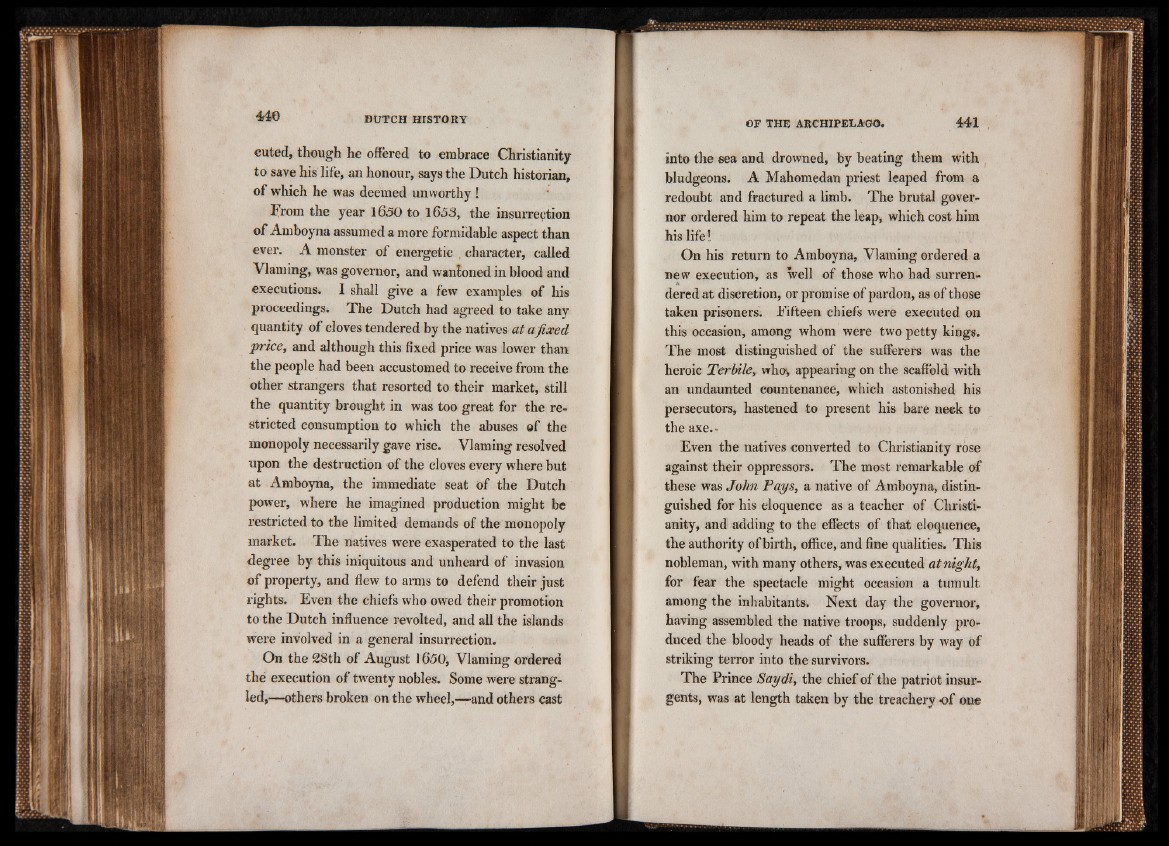
cuted, though he offered to embrace Christianity
to save his life, an honour, says the Dutch historian,
of which he was deemed unworthy !
From the year 1650 to 1653, the insurrection
of Amboyna assumed a more formidable aspect than
ever. A monster of energetic , character, called
Vlaming, was governor, and wantoned in blood and
executions. I shall give a few examples of his
proceedings* The Dutch had agreed to take any
quantity of cloves tendered by the natives at afixed
price, and although this fixed price was lower than
the people had been accustomed to receive from the
other strangers that resorted to their market, still
the quantity brought in was too great for the restricted
consumption to which the abuses of the
monopoly necessarily gave rise. Vlaming resolved
upon the destruction of the cloves every where but
at Amboyna, the immediate seat of the Dutch
power, where he imagined production might be
restricted to the limited demands of the monopoly
market. The natives were exasperated to the last
degree by this iniquitous and unheard of invasion
of property, and flew to arms to defend their just
rights. Even the chiefs who owed their promotion
to the Dutch influence revolted, and all the islands
were involved in a general insurrection.
On the 28th of August 1650, Vlaming ordered
thé execution of twenty nobles. Some were strangled,—
others broken on the wheel,—and others cast
into the sea and drowned, by beating them with
bludgeons. A Mahomedan priest leaped from a
redoubt and fractured a limb. The brutal governor
ordered him to repeat the leap, which cost him
his life!
On his return to Amboyna, Vlaming ordered a
new execution, as well of those who had surrendered
at discretion, or promise of pardon, as of those
taken prisoners. Fifteen chiefs were executed on
this occasion, among whom were two petty kings.
The most distinguished of the sufferers was the
heroic Terbile, whoi, appearing on the scaffold with
an undaunted countenance, which astonished his
persecutors, hastened to present his bare neek to
the axe. -
Even the natives converted to Christianity rose
against their oppressors. The most remarkable of
these was John Pays, a native of Amboyna, distinguished
for his eloquence as a teacher of Christianity,
and adding to the effects of that eloquence,
the authority of birth, office, and fine qualities. This
nobleman, with many others, was executed at night,
for fear the spectacle might occasion a tumult
among the inhabitants. Next day the governor,
having assembled the native troops, suddenly produced
the bloody heads of the sufferers by way of
striking terror into the survivors.
The Prince Saydi, the chief of the patriot insurgents,
was at length taken by the treachery of one